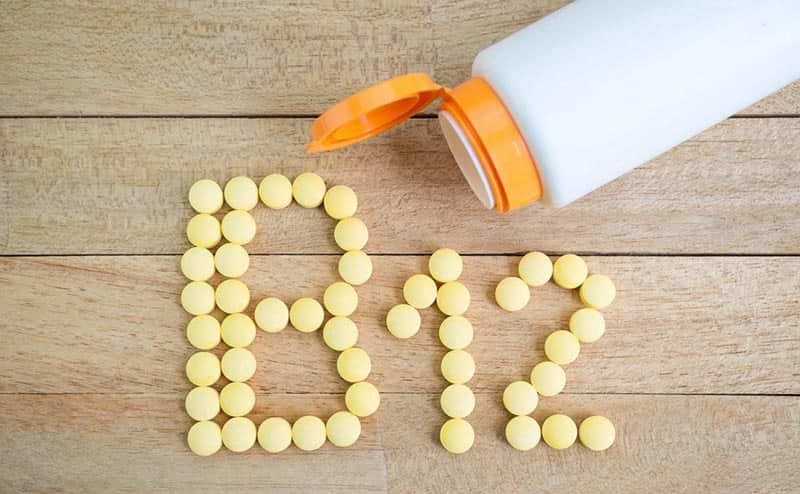turmeric Anti-Aging effects
Top #7 Turmeric: Anti-Aging effects If curcumin can really help prevent heart disease, cancer and Alzheimer’s, it would
Vitamin B12, or cobalamin, is an essential nutrient for the body to function properly. The elderly and those who do not consume animal products are more prone to a deficiency. What are the symptoms of a lack of vitamin B12 and how you can rebalance it ?

Cobalamin or vitamin B12 is essential for the production of red blood cells and the proper functioning of the nervous system. This group B vitamin is found naturally in animal products: dairy products, meats, fish and eggs. People who are vegans and vegetarians, as well as those who have reduced their consumption of foods of animal origin for health reasons, are therefore directly concerned by a risk of deficiency. But other populations can be affected.
Severe deficiency can lead to nerve damage, tingling or loss of sensation in the hands and feet, muscle weakness, loss of reflexes, motor difficulties, confusion, and dementia.
Between 10 and 30% of people over the age of 50 are also affected by a lack of vitamin B12, without even being aware of it. This is because absorption of this vitamin becomes more difficult with age. It is increasingly complicated for the body to assimilate the 2.4 micrograms recommended each day (mcg / day) for people over 18 years old.
Some type 2 diabetes medications and acidity regulators can also interfere with vitamin B12. Weight loss surgery and certain conditions such as celiac disease, Crohn’s disease, autoimmune diseases, and pernicious (or Biermer’s) anemia can block the natural absorption process of vitamin B12. People in diet and have reduced their consumption of meat can also encounter a deficiency.
Note: Necessary intakes of vitamin B12 increase for pregnant women (2.6 mcg / day) and for breastfeeding women (2.8 mcg / day)
Deficiency can manifest itself in many ways. Main symptoms are associated with all types of anemia, such as fatigue, weakness, breath shorted, dizziness, palpitations, tingling, numbness of the feet and hands, constipation, memory loss, irritability or swinging mood. Swollen tongue, is a misknown symptom but it is regularly mentioned by the patients.
Government guidelines recommend a daily intake of 2.4 micrograms (mcg) of B12 to prevent deficiency, but for optimal health and disease prevention, a recommend a daily dose will be 25 mcg. To get this much — particularly if you’re a strict vegetarian — you’ll probably need to rely on supplements or fortified foods. Indeed, B12 may be easier to absorb in supplement form.
If you’re over 50 years of age, have acid reflux, or have been told by your doctor that your body has trouble absorbing B12, aim for 400-800 mcg per day to give your body a better chance of absorbing what it needs. Don’t worry about overdoing it – there’s no upper limit, which means there’s no evidence that high levels (up to 1,000 mcg) are harmful.
In case of deficiency, tablets are most often prescribed. If there is a problem with absorption, treatment with injections is considered. Depending on the cause of the deficiency, it may be necessary to follow the treatments for life.
of course, as we saw above, some food contain vitamin B12 such meat, fish, seafood, eggs and dairy products, those food are usually an enough source of vitamin B12 , but with the cooking they loose an important part of their nutrients. helder people and people with gastric issue cannot properly assimilate the vitamin and with time they find them self in deficiency. Here nutriment play their entire role in bringing balance and preventing diseases linked to this deficiency.
The most reliable examination is based on the determination of the concentration of methylmalonic acid in the urine. Blood test is not accurate enough to give you the exact amount.
Top #7 Turmeric: Anti-Aging effects If curcumin can really help prevent heart disease, cancer and Alzheimer’s, it would
Top #6 Arthritis Patients Respond Very Well to Turmeric Supplements Share on facebook Share on twitter Share on
Top #5 Improved Antioxidant Capacity Share on facebook Share on twitter Share on pinterest Share on email Antioxidants
Statements on this website have not been evaluated by the Food and Drug Administration. Products are not intended to diagnose, treat, cure or prevent any disease. If you are pregnant, nursing, taking medication, or have a medical condition, consult your physician before using our products.
Disclaimer: this site is not a part of the Facebook™ website or Facebook Inc. Additionally, this site is NOT endorsed by Facebook™ in any way. FACEBOOK is a trademark of FACEBOOK, Inc.

Your Privacy Is Important To Us
This website uses cookies so that we can provide you with the best user experience possible. Cookie information is stored in your browser and performs functions such as recognising you when you return to our website and helping our team to understand which sections of the website you find most interesting and useful.
Strictly Necessary Cookie should be enabled at all times so that we can save your preferences for cookie settings.
If you disable this cookie, we will not be able to save your preferences. This means that every time you visit this website you will need to enable or disable cookies again.
More information about our Cookie Policy